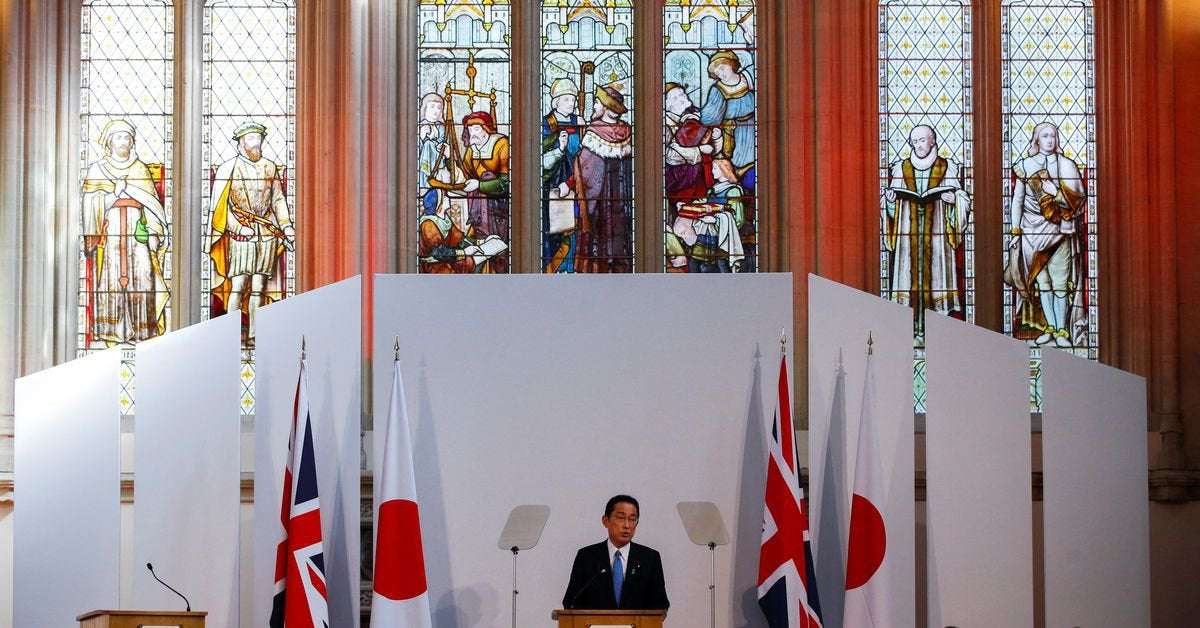Japanese Prime Minister Fumio Kishida delivers a speech at the Guildhall in London, Britain May 5, 2022. REUTERS/Peter Nicholls
LONDON, May 5 (Reuters) - Japan's Prime Minister Fumio Kishida said on Thursday that it would use nuclear reactors to help reduce its own and other countries' dependence on Russian energy.
Japan has become more reliant on Russian gas since shutting down nuclear reactors after the 2011 Fukushima disaster in which an earthquake and tsunami triggered a meltdown, devastating its north-eastern region.
But facing elections in July and rising energy prices that are squeezing voters' budgets, Kishida said nuclear would be part of the country's future energy policy.
Register now for FREE unlimited access to Reuters.com Register
He said Japan would address the "vulnerability of our own energy self-sufficiency" by broadening where it buys energy from, promoting renewables and using nuclear power to diversify its sources of generation.
"We will utilise nuclear reactors with safety assurances to contribute to worldwide reduction of dependence on Russian energy," Kishida told an audience in London's financial district.
"Restarting just one existing nuclear reactor would have the same effect as supplying 1 million tonnes of new LNG (Liquified Natural Gas) per year to the global market."
More than a decade after the March 2011 earthquake and tsunami triggered the worst nuclear crisis since Chernobyl, nuclear power remains a difficult issue in Japan, where only a handful of its 30-odd plants are currently operating. read more
But a majority of the public and businesses want the government to restart nuclear reactors to address energy security, with the Ukraine crisis and higher energy costs having added momentum to that shift in opinion.
Kishida addressed the City of London with the pro-investment messages: "Japan is a buy". read more
He said 150 trillion yen ($1.16 trillion) in investment would be raised in the next decade to meet its goals of carbon neutrality by 2050 and to reduce greenhouse gas emissions by 46% by 2030.
He outlined a roadmap to 2030 focused on maximising use of "pro-growth carbon pricing" and promotion of long-term projects.
Reporting by Tommy Wilkes and Muvija M, writing by William James and Tetsushi Kajimoto; Editing by Kate Holton and John Stonestreet
Our Standards: The Thomson Reuters Trust Principles.

goyablack on May 5th, 2022 at 13:38 UTC »
Japan is also beefing up its military defense forces to include fixed-wing aircraft carriers, something it hasn't had since WWII. 1. They also accuse Russia of illegally occupying four islands which they claim sovereignty over. 2. Not to mention they are upset because Russia pulled out of peace talks which were an attempt to formalize a peace treaty between the two countries that was never established post-WWII. 3. To be clear, I have no qualms with a foreign country reducing its dependence on the west by beefing up its military defense forces. Also if you'd like to know more details about the disputed islands then check out this video.
forebill on May 5th, 2022 at 12:46 UTC »
I would recommend putting the backup cooling pumps above ground this time.
Pattoe89 on May 5th, 2022 at 12:07 UTC »
This is a huge deal. The Japanese were already very cautious about nuclear energy BEFORE Fukushima, due to their obvious history.
Then when Fukushima happened and nuclear powerplants were decommissioned, it was pretty much accepted that Japan would never go back to nuclear energy.
It seems like the only thing that can overcome Japan's distrust of nuclear energy is Japan's distrust of Russia.